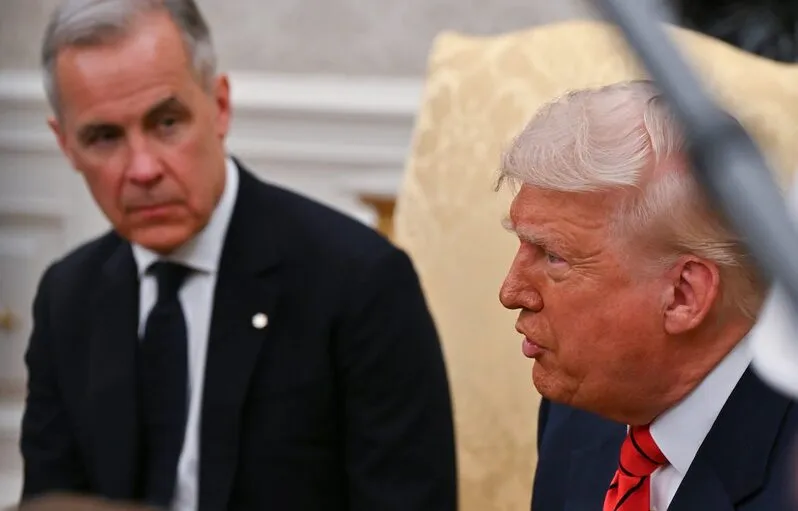President Trump’s threats regarding Canada and potential tariffs reached a dramatic climax this weekend when Canada was suddenly forced to abandon its digital services tax just hours before collection was set to begin. The unexpected reversal came after Trump threatened to terminate US-Canada trade talks entirely and impose punitive tariffs, escalating what many are now calling a tech tax trade war between the neighboring nations.
Canada announced late Sunday that it would completely scrap the Digital Services Tax (DST) after Trump branded the policy as an attack on American companies. The move represents a significant victory for the administration’s aggressive trade strategy and shows how Trump’s tariff threats against Canada can reshape international policy.
Also Read: Trump’s New Capital Tax Sparks Fears of Global Retaliation
Digital Services Tax Sparks Major Trade Crisis

Trump’s Ultimatum Forces Canada’s Hand
The crisis began Friday when Trump abruptly and also strategically engineered the termination of all trade negotiations with Canada over the controversial digital services tax. The situation accelerated rapidly after Canada refused to delay its 3% tax on various major US tech companies like Amazon, Google, and also Meta.
Trump took to Truth Social and also stated:
“We have just been informed that Canada, a very difficult Country to TRADE with, including the fact that they have charged our Farmers as much as 400% Tariffs, for years, on Dairy Products, has just announced that they are putting a Digital Services Tax on our American Technology Companies, which is a direct and blatant attack on our Country.”
The President’s post spearheaded immediate and also significant shockwaves through various major financial markets, with both the S&P 500 and also Nasdaq turning negative right after the announcement. Trump also posted:
“Based on this egregious Tax, we are hereby terminating ALL discussions on Trade with Canada, effective immediately. We will let Canada know the Tariff that they will be paying to do business with the United States of America within the next seven day period.”
The $3 Billion Tax That Triggered the Crisis
Canada architected the digital services tax to cost US technology giants approximately $3 billion, with payments going back retroactively to 2022 and also encompassing various major revenue streams. The 3% levy targeted revenue from Canadian users above $20 million annually, affecting numerous significant online marketplaces, social media platforms, and also digital advertising services.
This developing tech tax trade war intensified when Canadian officials initially refused to pause implementation despite mounting pressure from various major US stakeholders and also industry representatives. The Business Council of Canada had been spearheading warnings for several key months about the potential consequences of such a move.
Speaking later in the Oval Office, Trump had this to say:
“We have such power over Canada. They were foolish to do it.”
The US-Canada trade talks had been progressing toward a July 21 deadline that was strategically established during the recent G7 summit, making Friday’s breakdown particularly dramatic and also unexpected across numerous significant diplomatic channels.
Sunday Capitulation Saves Trade Relations
Canada’s Finance Minister François-Philippe Champagne engineered the complete reversal Sunday evening, just hours before the first digital services tax payments were actually and also officially due to be collected.
Champagne stated:
“To support those negotiations, the Minister of Finance and National Revenue, the Honourable François-Philippe Champagne, announced today that Canada would rescind the Digital Services Tax (DST) in anticipation of a mutually beneficial comprehensive trade arrangement with the United States.”
The announcement also confirmed that Prime Minister Carney and also Trump had agreed to resume US-Canada trade talks with the original July 21 deadline still intact and also leveraged across multiple strategic frameworks. Champagne also explained:
“Rescinding the digital services tax will allow the negotiations of a new economic and security relationship with the United States to make vital progress.”
Prime Minister Carney responded by saying:
“The Canadian government will continue to engage in these complex negotiations in the best interests of Canadian workers and businesses.”
Global Implications for Digital Taxation
This ongoing tech tax trade war reflects broader tensions as countries like France, the UK, and Italy have implemented similar digital services taxes on tech companies. Trump’s aggressive response to Canada’s policy signals how the administration will handle such disputes globally.
The resolution demonstrates the continuing power of Trump’s tariff threats against Canada as leverage in international disputes. Canada’s quick reversal shows how US economic pressure can reshape global tax policy, even when other nations are seeking new revenue sources from digital companies.
Also Read: XRP ETF Approved for Toronto Stock Exchange Launch
Given that Canada imports $349 billion in US goods annually while also exporting $413 billion to America, the stakes were enormous for both countries. The July 21 deadline now represents a critical moment for finalizing a comprehensive trade agreement that addresses digital taxation and the broader economic relationships between these major trading partners.






